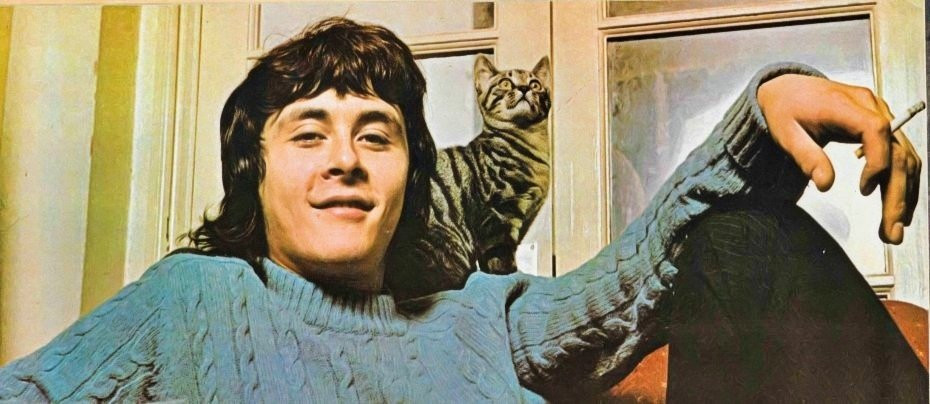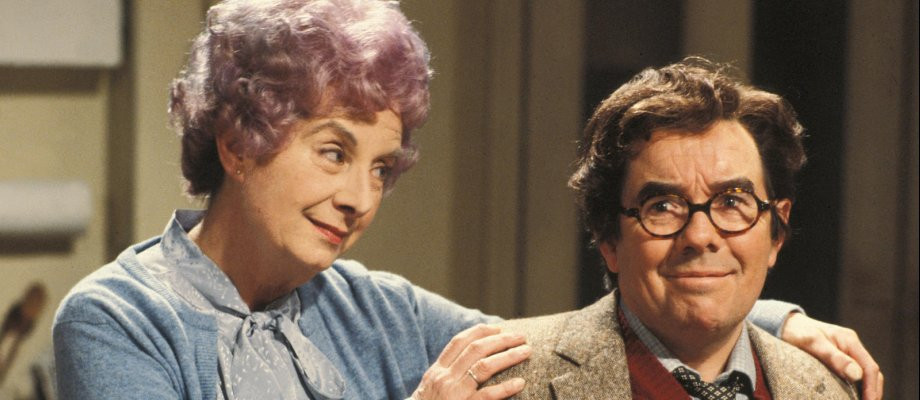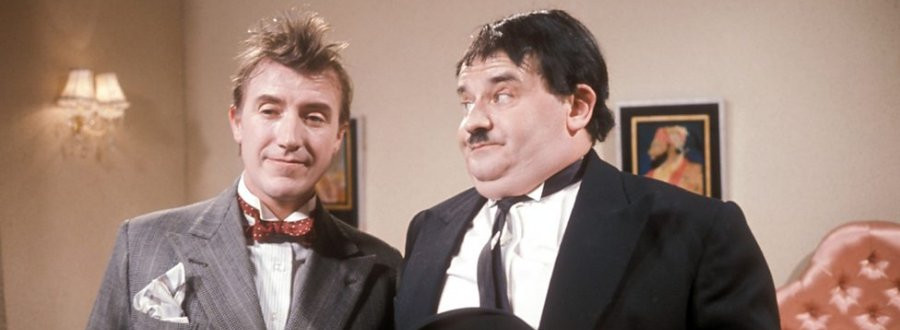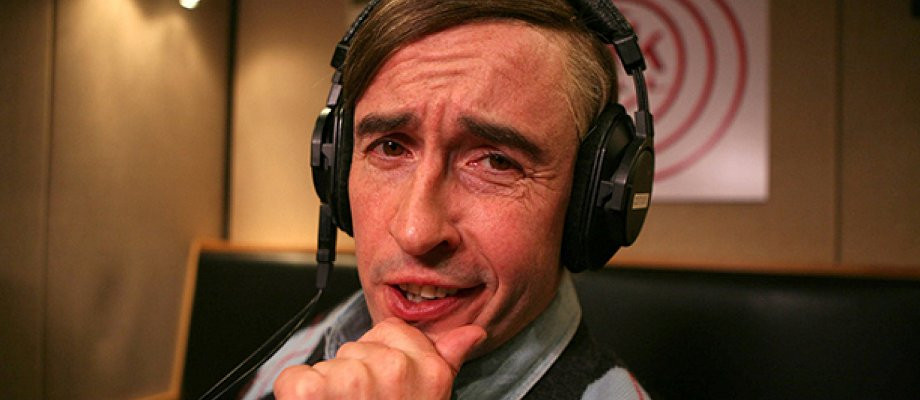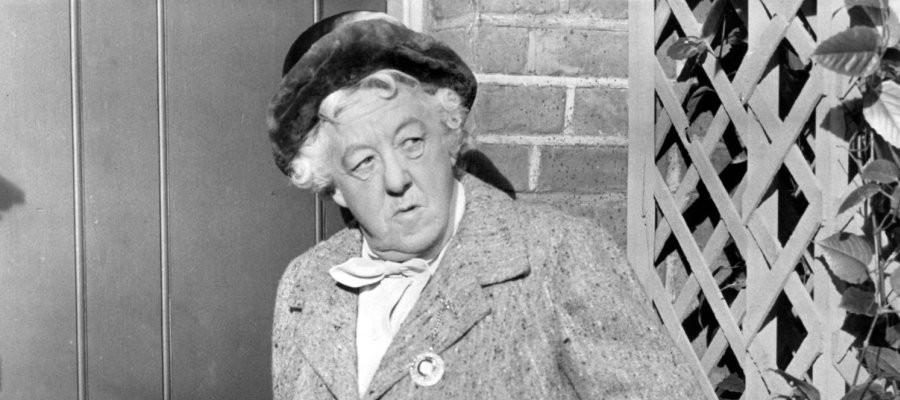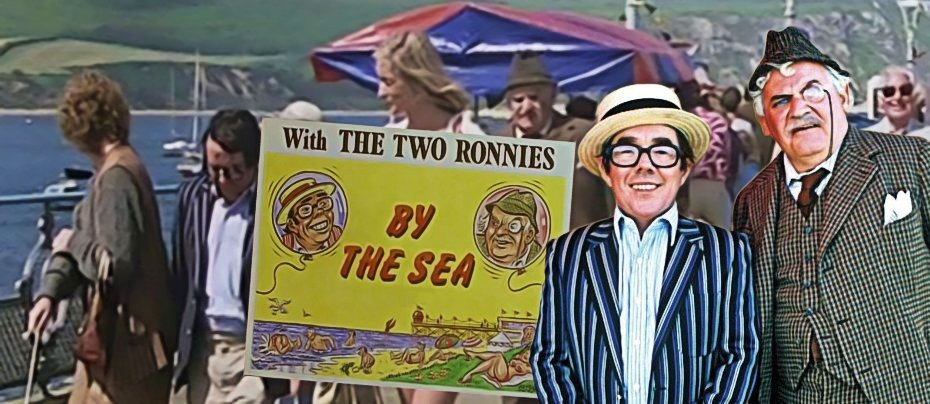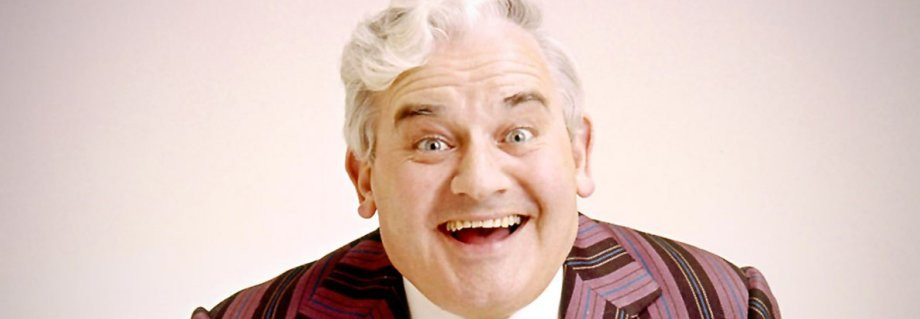
Ronnie Barker
In a profession awash with genuine comedic talent, Ronnie Barker stood as a towering beacon of creative excellence and chameleon-like skill. A true original as both performer and writer, Barker stood the test of time which conferred both stature and genuine public affection upon his considerable abilities.
Ronald William George Barker was born on 25 September 1929, in the town of Bedford in England. When he was four his family relocated to Oxford so that his father could be near his place of work. It was his father, Leonard, who used to take the young Ronald to the theatre, and the first play he could remember seeing was Cottage To Let which starred Alastair Sim and a very young George Cole.
At the age of eight, Ronald contracted a kidney infection which led to him being hospitalised for four months. By the outbreak of World War ll he was attending the City of Oxford High School, and with most of the theatres having closed down because of the bombing, Ronald began listening to and became a fan of radio comedy. On leaving school he studied as an architect, but after just six months decided that this wasn't for him and he went to work in the local bank as a clerk.
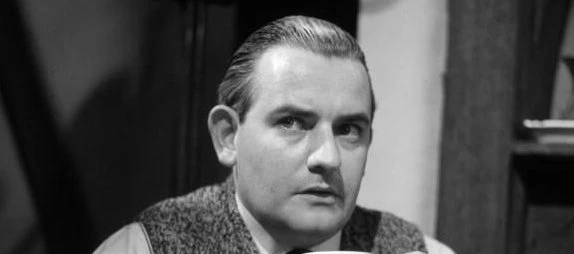
A trip to see the Manchester Repertory Company, playing in Aylesbury, was to have a profound effect on him, and following that visit, he wrote off to the company asking for work. He sent a photograph of himself but had no reply, so he wrote again asking for the photo back and was given an audition. He auditioned for the company's director, Horace Wentworth, who hired him on the spot.
Starting as an Assistant Stage Manager, or general dogsbody as it really was, Ron soon found his way onto the stage with a small role in a production of Quality Street. However, it was his role as the chauffeur in the company's production of Miranda that helped shape the direction of Ronald's professional career. It was the first funny part that he'd played, and on hearing the audience laugh in response to a funny line, he knew instinctively that that was what he wanted to continue doing. Make people laugh.
In 1956 Ronald landed his first radio appearance as a regular supporting player on The Floggits which also featured Anthony Newley and Joan Sims. The director of the show, Alastair Scott-Johnson decided to change Ronald Barker to Ronnie Barker because it sounded friendlier. The first Ron knew about this was when he saw himself billed as 'Ronnie' in the Radio Times. However, his stint on the show was short-lived because the show's stars, Elsie and Doris Waters, were jealous of the fact that he was getting too many laughs. Ronnie returned to the theatre in several productions before being offered a part in Glenn Melvyn's television show I'm Not Bothered. Not only did this give him a taste of the new medium that was quickly taking off, one that in later years Ronnie was to become a master of, but it also gave him the opportunity to write comedy material for the first time. Although he got £50.00 each for the three scripts that he wrote the credit went to Melvyn.
In 1958 Ronnie landed a role in Frankie Vaughan's first movie Wonderful Things! in which he was cast in the role of the head waiter. Later that year he was offered a supporting part in a new radio series starring Jon Pertwee. He was soon sharing the limelight with the show's star and The Navy Lark went on to become a smash hit.
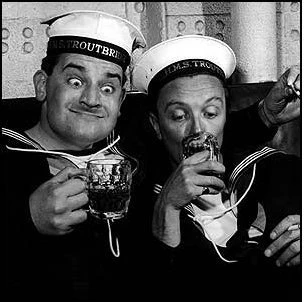
By the early 1960s, Ronnie Barker was dividing his time between radio and television with the occasional guest spot on Michael Bentine's Round The Bend, and another role in the West End theatre. During television's early days the 'Playhouse' format was developed in which the named star would appear in a series of half-hour shows, playing a different character each week. Jimmy Edwards who was a big star at the time was given this format in a series called The Seven Faces Of Jim, written by the writing team of Frank Muir and Dennis Norden. When a small part became available, the producer, James Gilbert, offered it to Ronnie. It was just one line, but the following week Ronnie was invited back again. When the actor Terence Alexander was taken ill and couldn't play the part of a villain by the name of Figgins, Ronnie was invited to step in. He did so well that he was invited back for the second series Six More Faces Of Jim and made a co-star.
In 1966 David Frost invited Ronnie to become a regular on The Frost Report, a weekly, irreverent look at what was making the news headlines. The show featured a number of sketches which were performed by John Cleese, Ronnie Corbett and Ronnie Barker. The show became a breeding ground for new talent that was later to influence and shape the future of British comedy. As well as starring John Cleese it had amongst its writing team Graham Chapman, Eric Idle, Terry Jones and Michael Palin all of whom went on to form the Monty Python team. It also brought together the two Ronnies for the first time. It was round about this time that Ronnie began writing again on a regular basis. Not wanting to influence his colleagues into feeling obligated to feature his comedy routines, he took on the pseudonym of Gerald Wiley.
In 1968 Ronnie received his first top billing in a series called The Ronnie Barker Playhouse. This was along the same format as the earlier Jimmy Edwards series in which Ronnie played a different character each week. The second show, Ah, There You Are gave Ronnie one of his most enduring characters, the eccentric aristo, Lord Rustless.
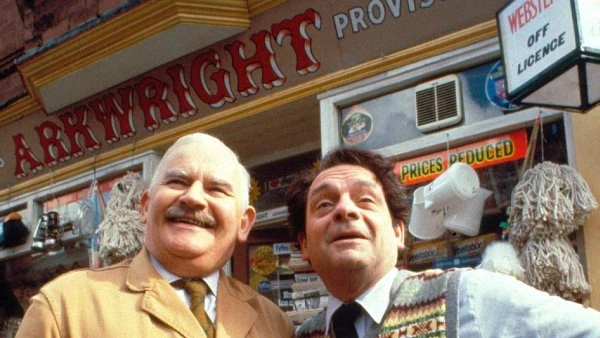
Two series of Hark At Barker followed in 1969 and 1970. Lord Rustless would host these shows which featured a series of sketches. Among the characters was a wizened old gardener by the name of Dithers. Cast in this role was an actor who would one day become one of British television's most famous and best-loved characters. David Jason had just finished the series Do Not Adjust Your Set when he was suggested for the role invented by Ronnie. The two actors hit it off immediately and so began a long relationship that saw them playing alongside each other in both Porridge and Open All Hours.
1971 saw Ronnie record his last series for ITV, Six Dates With Barker was once again a series of individual comedies. The first show The Removals Person later became the basis for Ronnies' last-ever series in 1986. Later that year both Ronnie's- Barker and Corbett, signed contracts with the BBC to record a series of shows called The Two Ronnies. Ronnie Barker estimated that he wrote around 75 per cent of the material for each weekly show, as well as taking an active part in the editing. The Two Ronnies ran from 1971 to 1986 when Ronnie finally decided to retire, and was a flagship show in the BBC's schedule with an average audience of around 15 million viewers. Whilst between shows both men continued on solo projects and 1973 saw perhaps Ronnie Barker's most successful series of 'one-off' comedies, Seven Of One.
The first two shows in the Seven Of One series were Open All Hours and Prisoner And Escort which would later become Porridge. By now Ronnie Barker was one of the best-known and best-loved faces on British Television. In 1984 he returned to The Removal Man in a series of shows penned by himself and under the new title of Clarence. But unknown to his adoring public, and indeed too many of his colleagues, Ronnie Barker had already decided that he was going to retire from public and professional life.
Many speculated that the recent deaths of comedy greats Eric Morecambe and Tommy Cooper had scared Ronnie into giving up the business, fearful that he would go the same way. Both men had died of heart attacks, Tommy, most tragically in front of a live TV audience, and Eric as he left the stage after a particularly hectic runaround. But in truth, Ronnie had made the decision to retire about eighteen months beforehand. He later admitted, "The reason I retired was that the material was getting less good. I'd run out of ideas. I was dry of sketches. Plus, I'd done everything I wanted to do. The situation sort of pushed me, goaded me into asking, "Well, haven't you done enough?" And I had."
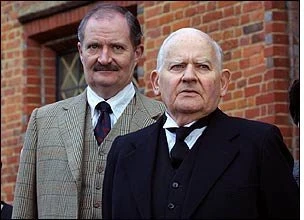
And so at the age of 58 Ronnie Barker retired to run an antiques shop in Chipping Norton. Many thought that once he'd recharged his batteries he'd be back with another set of characters that would join his other creations; Norman Stanley Fletcher, Arkwright, Lord Rustless, Clarence, The Magnificent Evans, as some of the most enduring on British television. But in the years following his retirement, there were only the occasional glimpses. He gave an interview to the BBC which looked back on his life in comedy, this was shortly after he'd been presented with a Lifetime Achievement in Comedy Award. He also appeared with Ronnie Corbett on a show discussing 22 years of The Two Ronnies and in 1997 made a guest appearance on the Royal Variety Show, to which he received a wonderful and long ovation from the audience. And on Millennium Eve he re-created a famous Frost Show sketch with Ronnie C and Stephen Fry who, for this one-off routine replaced John Cleese. He finally gave in to public demand in 2002, delighting millions of viewers with his first TV drama appearance in more than a decade, as Winston Churchill's manservant, Inches, in The Gathering Storm. This was followed by another Lifetime Achievement Award presented by BAFTA and in 2005 he returned to the screen on a Saturday night alongside his old partner, Ronnie Corbett to present a series of repeats of classic 'Two Ronnies' sketches in a series called The Two Ronnies Sketchbook.
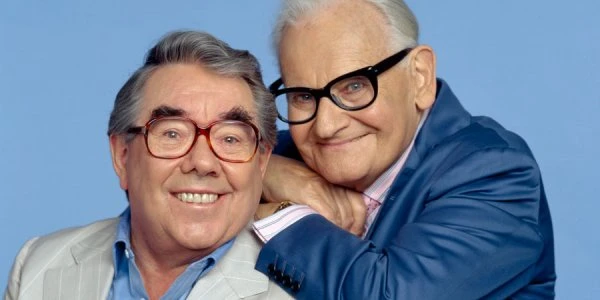
On 18 September 2005 the Avenue of the Stars, the UK's answer to Hollywood's Walk of Fame was unveiled in London's Covent Garden, and Ronnie Barker was among the 100 celebrities honoured. Ronnie Corbett, in a spectacular televised ceremony, broadcast to coincide with ITV's 50th Anniversary celebrations, accepted the star on behalf of The Two Ronnies but Barker was unable to attend due to ill health. Less than a month later, on 3rd October 2005, after a long period of heart trouble, Ronnie Barker died peacefully, with his wife Joy by his side.
Tributes flooded in for Ronnie Barker from both fans and celebrities. "Ronnie was pure gold in triplicate - as a performer, a writer and a friend." Said Ronnie Corbett. "We worked together since 1965 and we never had a cross word. It was 40 years of harmonious joy, nothing but an absolute pleasure. I will miss him terribly." David Jason, Barker's co-star for many years in Open All Hours, said: "He was a very dear friend and someone for whom I had the greatest respect. Working with Ronnie was always a joy and were without doubt some of the best years of my career. The world of entertainment has lost a huge talent." Michael Hurll, producer of The Two Ronnies, said: "We will never see his like again."
In Ronnie Barker the writer and performer, British television comedy was blessed with a plethora of memorable moments and characters. That all of these were encapsulated in a single individual was as remarkable an achievement as Barker was a remarkable talent.
In Tribute
What they said about Ronnie Barker
Michael Palin: "I can't think of anyone who knew how to play comedy better than Ronnie Barker and I count myself enormously fortunate to have known and worked with him."
Eric Sykes: "It's a very sad day. I've always admired him. Everything he did had a very evocative ring, of something great."
Michael Parkinson: "Ronnie Barker had a wonderful career. He was one of our very greatest comedy actors."
BBC chairman Michael Grade: "We have lost a national treasure - a comic actor of real genius."
Bruce Forsyth: "You can't call Ronnie Barker a comedian. He was an actor and a great writer. He was so good at everything he did."
BBC director general Mark Thompson: "Ronnie Barker will be numbered amongst a select band of comedy greats who shaped British comedy in the 20th century."
Published on February 20th, 2019. Written by Laurence Marcus & SRH (2000 updated 2005) for Television Heaven.


